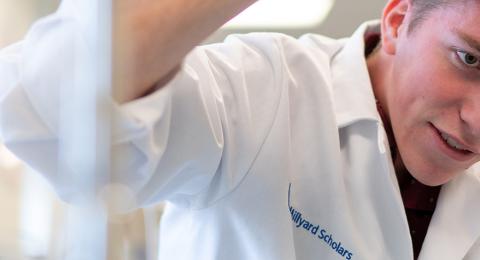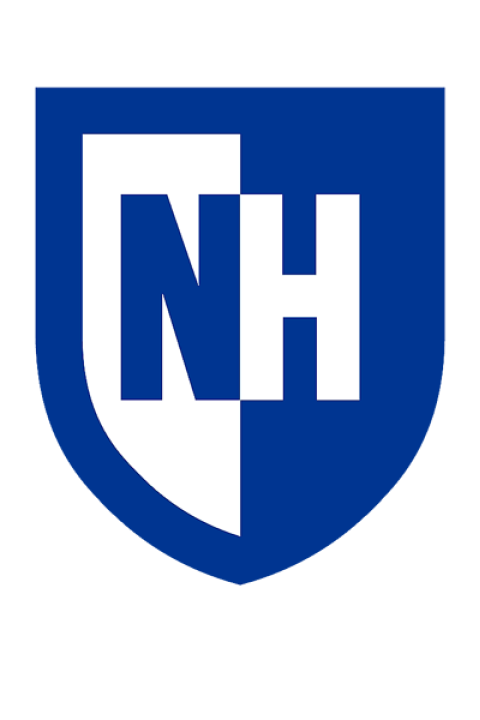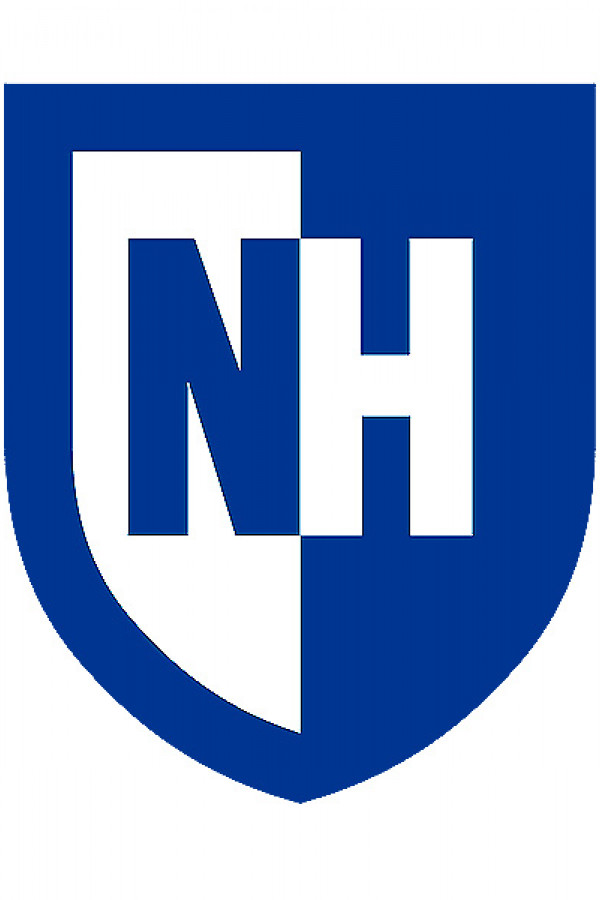Channeling scientific curiosity to fuel discovery and innovation
Exploring topics like biochemistry, molecular biology and genetics, our biotechnology program puts you at the heart of one of the newest and fastest-growing scientific fields. You’ll learn about the modern-day technological applications of living systems and organisms through hands-on work in our cutting-edge lab spaces. You can tailor your biotech degree toward pre-health and pre-med to help you meet requirements for medical school or graduate programs.
What is biotechnology?
Biotechnology is one of the newest and fastest-growing scientific fields. Exploring topics like biochemistry, molecular biology and genetics, biotechnology seeks to apply biological processes to technologies that can help improve our lives and planet. This cutting-edge field is changing the world in a variety of ways, from reducing the spread of infectious disease through genetics to cutting greenhouse gas emissions with biofuels.
Why study biotechnology at UNH Manchester?
Through hands-on experiential learning, the biotechnology program at UNH Manchester prepares students for careers or graduate study in medicine, biomedical research, microbiology and more. Biotechnology majors work side-by-side with classmates and faculty on research projects in our state-of-the-art laboratories—and have the opportunity to intern at high-profile biotech firms in the area. Students can also work with faculty mentors to customize the degree around their interests and create an academic plan to complete admission requirements for a variety of professional graduate programs.
Potential Career Areas
- Biomedical research and development
- Dentistry
- Manufacturing
- Medicine
- Microbiology
- Pharmacy
- Quality assurance/regulatory affairs
- Quality control
- Sales and technical support
- Veterinary practice
The industry-focused M.S. in Biotechnology: Industrial and Biomedical Sciences combines skill-based training in our state-of-the-art labs and innovative experiential learning opportunities with local companies in the biotechnology, pharmaceutical and medical technology fields. Qualified students can earn a B.S. and M.S. in just five years by taking graduate-level courses during senior year. Learn more
The Millyard Scholars Program provides scholarships, research opportunities and distinctive academic programming to exceptional incoming biotechnology students. Learn more and apply
Connecticut and Rhode Island do not offer a bachelor's-level biotechnology program in their public universities, so students from these states can enroll at a reduced tuition rate.
Curriculum & Requirements
Biotechnology is the use of living organisms, biological systems, and small chemicals and biomolecules in technology. Biotechnology has applications in the treatment of diseases, the production of food, the protection of ecosystems, and the generation of energy, as well as in the basic science study of many biological questions.
The B.S. in biotechnology at UNH Manchester is designed to:
- allow students to earn a baccalaureate degree in biotechnology at UNH;
- allow students to combine study in biotechnology with other programs and disciplines by completing a minor, or a self-designed set of elective courses along with their biotechnology degree;
- provide an opportunity for students to complete a baccalaureate degree in biology while preparing to pursue a Master's degree in biology, biotechnology, or other fields. These degree programs could be undertaken after completion of the B.A. Alternatively, UNH offers several accelerated Master's programs where excellent senior students in the Biological Sciences major can complete coursework towards their undergraduate and graduate degrees at the same time;
- allow students to complete a major in biotechnology while taking required courses in education in preparation for the five-year M.A.T. or M.Ed. programs and state certification in secondary science education; or alternative state certification pathway;
- provide an opportunity for students to complete a baccalaureate degree in biotechnology while completing the required courses for admission to medical, dental, veterinary, physician assistant, pharmacy, physical therapy, optometry, and other professional or graduate programs.
- allow students to complete a baccalaureate degree in biotechnology while completing the required courses for admission to graduate research programs (M.S. or Ph.D.) in the life sciences and related fields.
Employment opportunities in the public and private sectors include biotechnology research, development, and manufacturing; education; research laboratories; clinical laboratories; forensic laboratories; jobs in diverse areas from research to quality control to sales in the pharmaceutical industry; industrial positions in the food industry; water and wastewater laboratories and facilities; and environmental research and monitoring.
For more information, contact the Office of Admissions, (603) 641-4150.
Sample Course Sequence
| First Year | ||
|---|---|---|
| Fall | Credits | |
| BIOL 413 | Principles of Biology I | 4 |
| CHEM 403 | General Chemistry I | 4 |
| ENGL 401 | First-Year Writing | 4 |
| MATH 425 | Calculus I | 4 |
| UMST 401 | First Year Seminar | 2 |
| Credits | 18 | |
| Spring | ||
| BIOL 414 | Principles of Biology II | 4 |
| CHEM 404 | General Chemistry II | 4 |
| PSYC 402 | Statistics in Psychology | 4 |
| Discovery Course | 4 | |
| Credits | 16 | |
| Second Year | ||
| Fall | ||
| BIOT 501 | Ethical Issues in Biology | 4 |
| CHEM 651 & CHEM 653 | Organic Chemistry I and Organic Chemistry Laboratory | 5 |
| Discovery Course | 4 | |
| Discovery Course | 4 | |
| Credits | 17 | |
| Spring | ||
| BMS 503 & BMS 504 | General Microbiology and General Microbiology Laboratory | 5 |
| CHEM 652 & CHEM 654 | Organic Chemistry II and Organic Chemistry Laboratory | 5 |
| GEN 604 | Principles of Genetics | 4 |
| Discovery Course | 4 | |
| Credits | 18 | |
| Third Year | ||
| Fall | ||
| 600/700 Biotechnology Concentration | 4 | |
| PHYS 401 | Introduction to Physics I | 4 |
| Discovery Course | 4 | |
| Elective Course | 4 | |
| Credits | 16 | |
| Spring | ||
| 600/700 Biotechnology Concentration | 4 | |
| BMCB 658 & BMCB 659 | General Biochemistry and General Biochemistry Lab | 5 |
| Discovery Course | 4 | |
| Elective Course | 4 | |
| Credits | 17 | |
| Fourth Year | ||
| Fall | ||
| 600/700 Biotechnology Concentration | 4 | |
| 600/700 Biotechnology Concentration | 4 | |
| Capstone | 4 | |
| Elective Course | 4 | |
| Credits | 16 | |
| Spring | ||
| 600/700 Biotechnology Concentration | 4 | |
| BSCI 701 | Senior Seminar I | 1 |
| Elective Course | 4 | |
| Elective Course | 4 | |
| Credits | 13 | |
| Total Credits | 131 | |
Degree Requirements
All Major, Option and Elective Requirements as indicated.
*Major GPA requirements as indicated.
Major Requirements
- Courses required in the major must be completed with a minimum grade of C-. Students must attain a minimum GPA in the major of 2.0.
- Transfer students must complete at least 24 credits in the major at UNH.
- BIOL 413 Principles of Biology I, BIOL 414 Principles of Biology II may be used to satisfy the biological sciences Discovery Program requirement.
- CHEM 403 General Chemistry I, CHEM 404 General Chemistry II may be used to satisfy the Physical Sciences Discovery Program requirement.
- PSYC 402 Statistics in Psychology or MATH 424B Calculus for Life Sciences/MATH 425 Calculus I may be used to satisfy the Quantitative Reasoning Discovery Program requirement.
- The UNH Manchester B.S. in biotechnology program is structured with three levels of coursework.
| Code | Title | Credits |
|---|---|---|
| Core Courses | ||
| BIOL 411 | Introductory Biology: Molecular and Cellular | 4 |
| or BIOL 413 | Principles of Biology I | |
| BIOL 412 | Introductory Biology: Evolution, Biodiversity and Ecology | 4 |
| or BIOL 414 | Principles of Biology II | |
| BIOT 501 | Ethical Issues in Biology | 4 |
| BMCB 658 & BMCB 659 | General Biochemistry and General Biochemistry Lab | 5 |
| BMS 503 & BMS 504 | General Microbiology and General Microbiology Laboratory | 5 |
| CHEM 403 & CHEM 404 | General Chemistry I and General Chemistry II | 8 |
| CHEM 651 & CHEM 653 | Organic Chemistry I and Organic Chemistry Laboratory | 5 |
| CHEM 652 & CHEM 654 | Organic Chemistry II and Organic Chemistry Laboratory | 5 |
| GEN 604 | Principles of Genetics | 4 |
| MATH 424B | Calculus for Life Sciences | 4 |
| or MATH 425 | Calculus I | |
| PHYS 401 | Introduction to Physics I | 4 |
| or PHYS 407 | General Physics I | |
| PSYC 402 | Statistics in Psychology | 4 |
| Advanced Biology Courses (600/700 level) | ||
| Select five courses (at least one course from each of the three categories) | 20 | |
| I. Advanced Biology courses | ||
BMS 702 | Endocrinology | |
BMS 705 | Immunology 1 | |
or BMS 705 & BMS 715 | Immunology and Immunology Laboratory | |
BSCI 620 | Global Science Exploration | |
BSCI 670 | Clinical Pathophysiology | |
BSCI 680 | Pharmacology | |
BSCI 695 | Exploring Biology Teaching (1-4 credits) | |
BSCI 735 | Cell Biology | |
BSCI 750 | Cancer Biology: From Benchtop Research to Therapeutic Interventions | |
GEN 711 | Genomics and Bioinformatics | |
or GEN 711W | Genomics and Bioinformatics | |
GEN 714 | Personal Genomics | |
GEN 771 | Molecular Genetics | |
| II. Laboratory Techniques courses | ||
BIOT 766 | Protein and Immunologic Techniques | |
BIOT 777 | Molecular Biology and Biotechnology | |
BMCB 753 | Cell Culture | |
CHBE 651 | Biotech Experience/Biomanufacturing (BTEC 220 GBCC) | |
ZOOL 625 & ZOOL 626W | Principles of Animal Physiology and Animal Physiology Laboratory | |
| III. Advanced Microbiology courses | ||
BMS 602 & BMS 603 | Pathogenic Microbiology and Pathogenic Microbiology Laboratory | |
BMS 706 & BMS 708 | Virology and Virology Laboratory | |
BSCI 737 | Microbial Genomics | |
BSCI 740 | Aquatic Microbiology | |
| Total Credits | 76 | |
- 1
BMS 705 Immunology, may optionally be taken with or without BMS 715 Immunology Laboratory.
Depending on their specific academic and career goals and in consultation with their advisor, students may elect to take additional supporting science courses and a full year of physics (e.g., take PHYS 402 Introduction to Physics II in addition to PHYS 401 Introduction to Physics I; or PHYS 408 General Physics II in addition to PHYS 407 General Physics I). These courses are often required for admission to medical, veterinary, and other professional and graduate programs.
| Code | Title | Credits |
|---|---|---|
| Capstone Experience | ||
| BSCI 701 | Senior Seminar I (during either semester of the senior year ) | 1 |
| Select a capstone experience: | 4 | |
BSCI 792 | Research | |
BSCI 793 | Internship | |
BSCI 795 | Independent Study | |
| Total Credits | 5 | |
BSCI 701 Senior Seminar I will meet weekly during either semester of the senior year in a seminar format. Students will share information about capstone experiences, listen to presentations on timely issues in biology, develop career preparation skills, and receive training in poster production. Other methods of oral presentation and scientific writing are explored as students prepare to present the results of their capstone activities at the Undergraduate Research Conference or other venues.
In addition, all students will take elective courses to fulfill the 128-credit requirement for a B.S. degree. These elective courses could fulfill the requirements for a major or minor in another program or they could fulfill a self-designed interdisciplinary concentration. These courses would be selected in consultation with their advisor.
Program Learning Outcomes
A student successfully completing the Biotechnology program will be able to:
- Understand the fundamentals of basic biological principles, concepts, and theories.
- Demonstrate the ability to evaluate, apply, and synthesize biological information and ideas.
- Be competent in basic biology and chemistry laboratory skills and with the use of common laboratory equipment and instrumentation.
- Be competent in advanced laboratory techniques and microbiological methods.
- Understand the professional and ethical responsibilities involved with current and emerging topics in biology.
- Demonstrate the ability to communicate technical information related to biological sciences and biotechnology related topics in scientific writing and oral presentations.
- Understand, analyze, and evaluate primary research literature involving biological sciences and biotechnology related topics.
- Understand and apply the process of the scientific method, including being able to formulate hypotheses, design and conduct experiments with adequate controls to test hypotheses, interpret and evaluate data, and draw conclusions.
- Gather, analyze, organize, evaluate, and present scientific data, including the use of technology to solve problems and communicate information.
- Demonstrate the ability to function as a member of a team.
- Understand current and emerging topics in biotechnology.
- Compete effectively for entry-level biotechnology industry employment and for admission to graduate or professional schools in their chosen area and be successful in these endeavors.
Explore Program Details
-
Associate ProfessorAssociate Professor of Biological Sciences and of BiotechnologyAffiliate Faculty Member, Hubbard Center for Genome StudiesEmail: Kyle.MacLea@unh.eduPhone: (603) 641-4129
-
Adjunct Faculty
-
Adjunct Faculty
Because of the popularity and size of our biotechnology program, we’ve more than doubled our laboratory space. You’ll get hands-on experience in our seven state-of-the-art laboratories: general biology, advanced biology, microbiology, general chemistry and organic chemistry, as well as the cell culture research lab and microbiology research lab.
UNH Manchester has dedicated its entire sixth floor to teaching and research facilities in the areas of bioengineering and cellular biology, opening doors to on-site internship and research opportunities with the Advanced Regenerative Manufacturing Institute (ARMI) and other start-up biotechnology firms.
Labs are stocked with the latest, cutting-edge equipment and are taught by residential faculty or experienced instructors, all of whom specialize in their discipline.
The industry-focused M.S. in Biotechnology: Industrial and Biomedical Sciences combines skill-based training in our state-of-the-art labs and innovative experiential learning opportunities with local companies in the biotechnology, pharmaceutical and medical technology fields. Qualified students can earn a B.S. and M.S. in just five years by taking graduate-level courses during senior year. Learn more
Our biotechnology program prepares you for graduate or professional studies, or for careers in industries from pharmaceutical and biomedical to education and business.
The Bureau of Labor Statistics projects positive growth in biotech professions between 2012 and 2022, translating to vast possibilities for your future. With advanced courses, hands-on lab experience and real-world challenges, you’ll get the knowledge and skills to make a big impact in this growing field.
Job Title | Job Growth | Average Salary |
| Biochemist or Biophysicist | 19% | $81,480 |
| Biological Technician | 10% | $39,750 |
| Biomedical Engineer | 27% | $86,960 |
| Medical Scientist | 13% | $76,980 |
| Microbiologist | 7% | $66,260 |
| Pharmacist | 14% | $116,670 |
| Physician or Surgeon | 18% | $118,200 |
| Veterinarian | 12% | $84,460 |
Curious about careers in biotech? Check out this podcast with Dr. Kyle MacLea, assistant professor of biology and biotechnology.
Our campus is in the heart of the region’s cultural, economic, entertainment and government activity — putting unlimited internship opportunities at your doorstep. We’ve partnered with local businesses to give you the real-world experience that sets you apart. Biological sciences majors have interned at many high-profile organizations in the area, including:
- Concord Hospital
- Manchester Water Works
- New Hampshire Audubon Society
- Normandeau Associates
We've partnered with Elliot Hospital to offer a robust job shadow at the Elliot Laboratory. Faculty members will select two students each spring and fall semester to participate in the shadow, which gives students hands-on experience in each section of the medical lab.
UNH has partnered with the Shoals Marine Laboratory (SML) to offer summer undergraduate courses and research internships at the SML field station in Kittery, Maine. With courses like marine mammal biology, wildlife forensics and underwater research, students get land- and boat-based experience in the field. SML credits can be applied toward your biological sciences major requirements.
Advising is available for UNH students, alumni, and post baccalaureates pursuing health professional careers. The Pre-Health Advising Office provides support throughout the process of preparing for health professions school from advising on the courses they should take to helping navigate through the complex steps of the application process.
In partnership with the New Hampshire community colleges below, we've developed a pathway to show you which courses at your community college will transfer into UNH Manchester's biotechnology program.




















